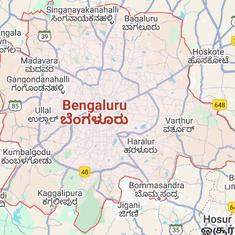CAA protests: Court rejects bail plea of Kashmiri woman who tested positive in NIA custody
Hina Bashir Beg from Srinagar and her husband Jahanzaib Sami Wani were arrested by the Delhi Police’s Special Cell from the Capital’s Jamia Nagar in March.

A court in Delhi on Tuesday denied bail to a Kashmiri woman who tested positive for the coronavirus while in the custody of the National Investigation Agency in a terror case, PTI reported.
Hina Bashir Beg and her husband Jahanzaib Sami Wani were arrested by the Delhi Police’s Special Cell from the Capital’s Jamia Nagar in March for allegedly instigating protests against the Citizenship Amendment Act. The couple were also suspected to have links to the Islamic State.
Beg is currently admitted to Delhi’s Lok Nayak Jai Prakash Hospital. Her lawyer told the court that treatment facilities at the hospital were inadequate. “Delhi is struggling to cope up with the rising number of coronavirus cases, that have gone up to 27,000 as of now and due to the lack of proper treatment facilities in government hospitals, which has also been highlighted in the media, the Delhi government has been compelled to issue a list of 56 private hospitals for treatment,” Beg’s bail application read.
The court told Beg’s lawyer that the charges against her were serious and that she could not be granted bail. The judge also asked her lawyer to suggest private hospitals for her treatment.
The NIA took custody of Beg and her husband and a Hyderabad-based Islamic State operative, named Abdullah Basith, from Tihar Jail on May 29, according to Hindustan Times. Authorities at the Tihar Jail had tested all three of them for the coronavirus and they were found to be negative. The NIA questioned the three suspects for nine days and it was during this time that Beg developed symptoms and later tested positive.
Also read:
Kashmiri couple arrested for alleged IS links was forced to move to Delhi by the lockdown in Valley
In March, Beg’s in-laws told Scroll.in that the couple had moved to Delhi only because the IT company that employed her husband wanted him to shift because of the internet blockade in Jammu and Kashmir. The family had also expressed disbelief over allegations against the couple.
Beg’s husband had been on the radar of intelligence agencies for a while. According to unidentified police officials, his role in the Afghanistan-based affiliate of the Islamic State had largely been restricted to spreading propaganda. Officials also claimed Wani had been in touch with a Pakistani operative who had been part of the Lashkar-e-Taiba before joining the Islamic State’s Khorasan module and had played a key role in recruiting young Kashmiris to militancy.
The Citizenship Amendment Act, passed by Parliament on December 11, provides citizenship to refugees from six minority religious communities from Bangladesh, Afghanistan and Pakistan, provided they resided in India for six years and entered the country by December 31, 2014. Huge protests had erupted across the country against the amended citizenship law, and Delhi’s Shaheen Bagh had become one of the most significant sites of demonstrations.









